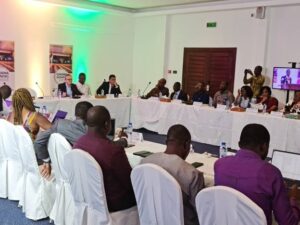Ghana Mining Expo has urged government to champion the development of a community development agreement policy to balance the interests of mining companies with local communities’ socio-economic development.
A community mining agreement is a collaborative framework between mining companies and local communities to ensure mining activities contribute positively to the area’s overall development. The primary goal includes mitigating environmental impacts, fostering community empowerment and sharing the benefits derived from mining operations.
Ghana, known for its rich mineral resources – including gold, has a long history of mining activities. The sector has played a crucial role in the country’s economy, but concerns about environmental degradation and social inequality have provoked discussions over introducing community mining agreements in recent times.
An impact assessment of corporate social responsibility activities in the sector has shown that major mining companies have their own policies which ensure the fulfilment of pledges through areas such as education, governance, health, infrastructure development (roads, housing, lighting) conservation and sanitation, as well as capacity building and agriculture.
However, there seems to be no standardised policy framework that serves mining companies as a benchmark; thus, the impact assessment is still very weak.

Mentioned areas include the development of strategies that look at how mining companies support their host communities at the end of every year. It has been observed that most mining companies are gradually establishing community development funds to finance their corporate social responsibility initiatives and programmes. For example, some mining companies offer US$1 from each ounce of gold produced and other royalties which benefit the communities; however, distribution of wealth seems not to be sufficiently transparent.
“This is why we envision that government should champion the development of a national community development agreement framework which revolves around the role of government in managing royalties, community initiatives, reporting and impact assessment in host communities,” a statement by Ghana Mining Expo read in part.
Key components of community mining agreement (CMA)
Environmental stewardship: CMAs in Ghana should emphasise sustainable mining practices to minimise ecological impact. More importantly, companies should be required to implement responsible mining techniques and adhere to environmental regulations.
Community empowerment: The agreement should empower local communities by involving them in decision-making processes related to mining activities. This can involve training programmes, employment opportunities and capacity-building initiatives, adds Ghana Mining Expo.
Revenue sharing: One of the critical aspects of CMAs is fair distribution of mining revenues. A predetermined percentage should be allocated to the community, contributing to local infrastructure development, education and healthcare.
Social infrastructure development: CMAs often include provisions for the establishment or improvement of social infrastructure such as schools, hospitals, and roads. This enhances the community’s overall well-being.
Challenges and lessons learnt
Although Ghana is the number-one producer of gold in Africa, communities still do not feel any impact in terms of development. With the discovery of critical minerals such as lithium, government must ensure a proper community development agreement. While Community mining agreements have shown promise, challenges persist. Ensuring transparency, effective communication and continuous monitoring are essential to addressing issues like revenue mismanagement and environmental compliance.
Chile and Bolivia’s experience with CMAs provides valuable lessons for Ghana; their framework highlights the importance of collaboration, regulatory oversight and a commitment to sustainable development.

In a follow-up visit with Prof. Miles Larmer, currently Head-African studies, Florida University, a discussion with Ghana Gold Expo team and some local mine owners shared critical insights on mining companies’ practices; the transparency of non-financial reporting that government needs to under-study; and a visit to Tarkwa and Nkroful in the Western Region, to meet some stakeholders offered a glimpse of the challenges faced by companies in meeting community expectations through CSR initiatives.
The visit’s aim was to enhance understanding of the complex relationship between mining, wealth distribution and local communities in Africa.
Background
About a year ago, a groundbreaking cooperation aimed at fostering corporate social responsibility and environmental social and governance (ESG) by the Ghana Gold Expo Foundation and Oxford University African Studies Centre was established. The cooperation was to organise the 1st Strategic Mining Workshop on CSR and Community Engagement, and Impact reporting.
This cooperation determined how both institutions could measure the impacts of corporate social responsibility in the mining sector, investment agreements between government and the mining companies, and the use of royalty funds – encompassing the issue of stakeholder engagement under human rights jurisdiction. The event brought together thought-leaders, experts and key stakeholders from the Ghana Chamber of Mines; University of Mines and Technology; Western Regional Coordinating Council; Minerals Development Fund; Minerals Income Investment Fund; mining companies and the Traditional Council – to drive community mining agreements in Ghana, and discuss the pivotal role of CSR in the extractive industry; particularly in the context of Ghana’s rich gold resources and the future of critical minerals like lithium.
Conclusion:
Community mining agreements represent a progressive approach to balancing the interests of mining companies and local communities. Dr. Steven Blessing Ackah, Executive Director-Ghana Mining Expo, in a statement said: “Community mining agreements have paved the way for more inclusive and sustainable development. As the global mining industry continues to evolve, it is expected that the Ghana model yet to be initiated will serve as an inspiring example of how extraction can contribute to the holistic development of a nation, and assess the extent to which current corporate social responsibility programmes and mechanisms are meeting the promise of these policies”.
This cooperation with local and international universities is very crucial, and has come at the right time as mining activities are the bedrock of our society – a requisite for Ghana’s development; and it also illustrates the need to have a national framework on CSR impact and reporting in host communities. Professor Miles Larmer indicated that plans are in place to provide certificate programmes on CSR and ESG for mining companies under the future critical Minerals like Akosdwomo Mining Ltd. and Atlantic Mining – both lithium mining companies, and other lithium companies in the future.










